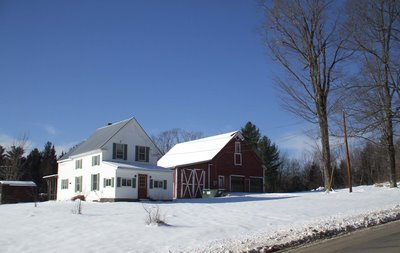
Some Immigrants Just Never Stop Immigrating
Here's a column I wrote at my old job seven years ago, but which seems applicable today. The picture is of my son, Gabe, and my dog, Mr. O'Malley, on a bluff overlooking the Mississippi on yet another move from Colorado to New York, in 1987.
The way I heard the story, my great-grandfather Pedersen was sailing into Copenhagen when he realized he'd made a mistake. Others in the family say he already knew he was only coming back to say good-bye.
In any case, he and his brothers had gone to America with a plan to earn money and buy farms back in Denmark. They worked around the country at about anything they could put their hands to and, somewhere along the line, he gave up the part about coming home again.
He wound up on the Upper Peninsula of Michigan, among a lot of other Scandinavians and some Cornishmen, too, who had come to the iron mines to make new lives for themselves. He never got rich, but he lived long enough to see his son head off to Wisconsin for college and then, later, move to Pennsylvania as manager of an iron mine there.
I'm sure it never occurred to him to tell his son not to move away. After all, it was how he had found his own place in the world. That seems to be what we built in this country: A family tradition in which you define yourself by who you are, not where you are.
My mother's family tree is full of people who were born with itchy feet, and who passed them on to their children. Great-great-great grandfather Leander Phoenix came from Quebec to Saratoga Springs, married a Broadalbin girl and then took her away to the midwest, where they produced a son, Josiah, who, as an adult, used to take long walks every Sunday, visiting a different church, sampling a different religion, each week. Just to see what it was like.
Another great-great-great grandfather on that side of the family came from Cork via London, then worked a farm in northern Indiana, where he helped the local priest build the first building of what would, 125 years later,
be my university. He moved on to Clinton, Iowa, and later out to Boone. Family tradition says he finally found a place to stay, not because it was perfect, but because that was where the horses died.
In short, we arrived as immigrants and never stopped moving. Some brothers and sisters along the way stuck a peg in and stayed put, but those in my direct line, my parents, grandparents and various degrees of greats, never did. Except for a few transitional periods, I don't think we ever had two adult generations living in the same place on this side of the Atlantic, and my own siblings are now in Colorado, Florida, New York, West Virginia and suburban DC, none closer than 300 miles to another.
It is, however, a willingness, rather than an eagerness, to move. That is a distinction often lost on those with an instinct to stay put.
When my father was about the age I am now, he'd already moved once, from Pennsylvania to New York, where he had built a solid career in the mining business and raised a family in an idyllic little town where people cared for each other.
But the company had become enmeshed in what was then a brand-new phenomenon, the leveraged buyout, and the new owners had started cannibalizing it to maximize profits and pay off the cost of acquisition. Decisions made, not by steel people in Pittsburgh, but by money people on Wall Street, were about to kill the mines, and the town that relied upon them. My father did not fancy presiding over this cold-blooded, miserable process.
For all the arrogance of a 20-year-old, I knew when to listen with respect, as we walked around the lake one spring day and my father poured out his frustrations and unhappiness. But when, a few months later, my little brother, his youngest son, was killed in an accident at 17, I challenged him.
"Tony never got a chance to do the things he really wanted to do with his life," I said to him. "When are you going to do the things you really want to do?"
A few months later, he called to tell me he'd found a job that combined his experience on the school board with his years of industrial management, as labor negotiator for the Kenmore School District. The change from life in
Star Lake to life in Buffalo was wrenching, but the price of staying in one place had been exacting a far greater toll.
It was time to move on, and so he moved on, and it was a good move. He finished out the last 10 years of his career doing something he wanted to do, something he truly enjoyed, something he could feel good about doing.
For all the wonderful, generous things my father did for us, I was never so proud of him as I was when he accepted the legacy of a family that has never let a well-established life and the fear and inconvenience of change
keep them from living the lives they must live.
Now my own adult children, speaking from their homes in New York, in Massachusetts and in Connecticut, have accepted the role I took before them, that of nagging their father into exchanging comfort for disruption,
into overturning his life for the better, into doing what he truly needs to be doing.
So this will be my last column for the Press-Republican, as I end 12 happy years in Plattsburgh, and set out for the next place.
Thanks for everything. Maybe we'll run into each other again, somewhere down the road.
Copyright 1999, Press-Republican, Plattsburgh NY



